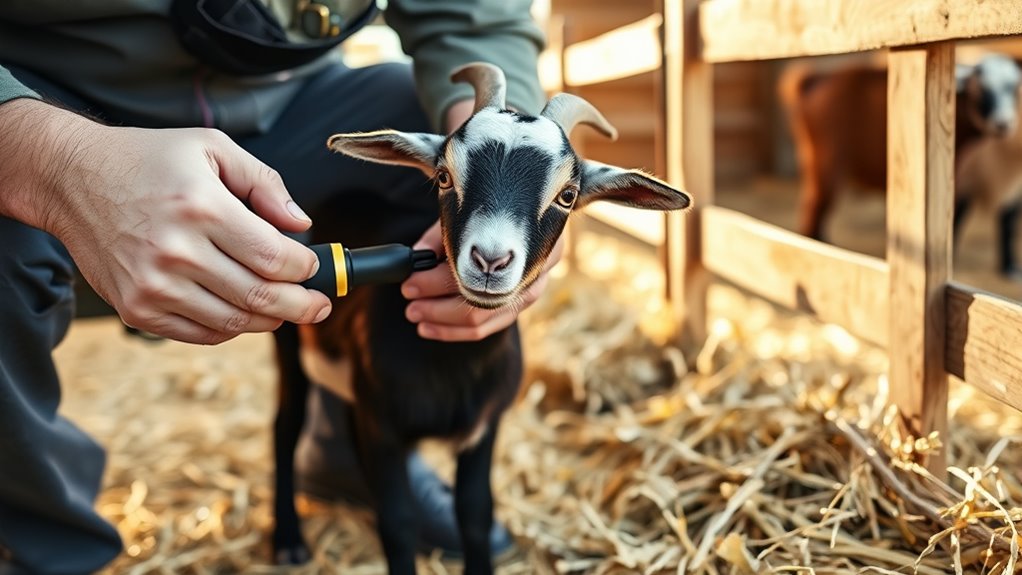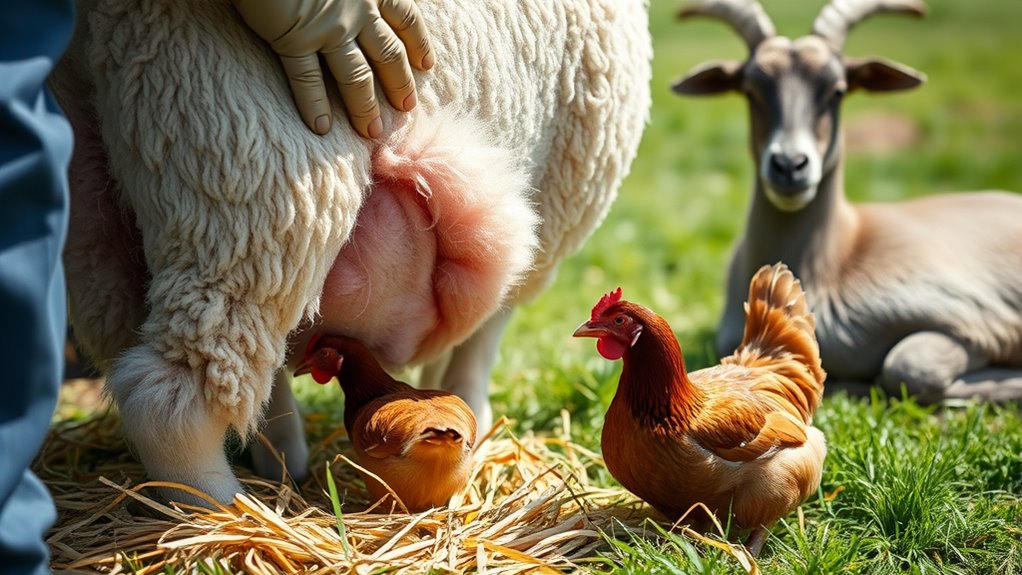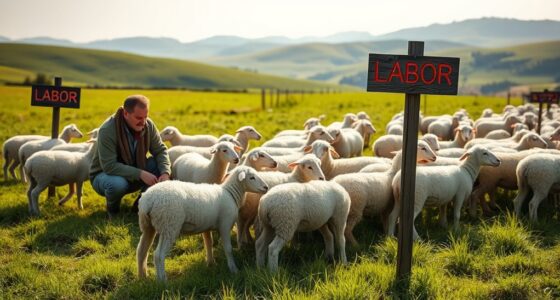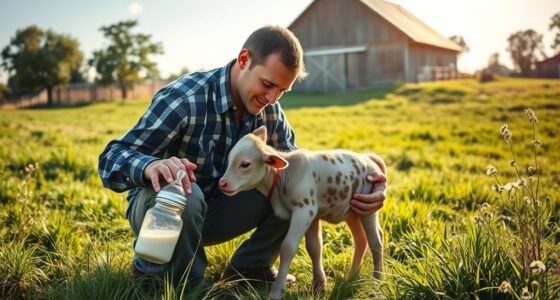To perform basic farm animal first aid and health checks, stay calm and assess injuries quickly. Clean minor wounds with water or antiseptic, then cover with sterile bandages. Regularly inspect your animals for signs of illness, swelling, or hoof problems, and maintain a clean, safe environment. Prevent injuries by repairing hazards and providing proper footwear. Routine parasite control and health checks help catch issues early. Keep learning to protect your livestock and ensure their well-being.
Key Takeaways
- Stay calm, assess the injury quickly, and determine if it is minor or severe for appropriate action.
- Clean wounds with water or antiseptic, then apply sterile bandages to prevent infection.
- Regularly inspect animals for signs of illness or injury, including hooves, skin, and overall behavior.
- Maintain a safe environment by removing hazards and ensuring fencing is secure to prevent injuries.
- Practice routine parasite control and health checks to promote overall animal wellbeing and early detection of issues.

Have you ever wondered what to do if your farm animal gets injured? Knowing the basics of first aid and health checks can make a significant difference in their recovery. The first step is to stay calm and assess the situation quickly. Once you identify the injury, determine whether it’s minor or severe. For minor cuts or scrapes, cleaning the wound with clean water or antiseptic solution helps prevent infection. Applying a sterile bandage can also protect the injury from dirt and further harm. However, if the wound is deep, bleeding heavily, or shows signs of infection, you should contact a veterinarian immediately.
Prevention is always better than treatment, so focusing on injury prevention is essential. Regularly inspecting fences and enclosures ensures there are no sharp edges or broken wires that could cause cuts. Maintaining a clean environment reduces the risk of infections. Additionally, providing proper footwear prevents hoof injuries and lameness. It’s also important to monitor your animals closely, especially during handling or transport, to avoid accidental injuries. Establishing a routine health check helps catch small issues before they become serious.
Parasite control plays an indispensable role in keeping your farm animals healthy and resilient against injuries. A parasite-infested animal is often weaker, more prone to illness, and less able to recover from injuries. Regular deworming and parasite management reduce the parasite burden and improve overall health. Keeping pastures clean and rotating grazing areas prevents parasite buildup in the environment. You should also inspect your animals frequently for signs of parasites, such as weight loss, anemia, or changes in behavior. Proper parasite control not only enhances their well-being but also reduces the likelihood of secondary injuries caused by weakened immune systems.
In addition to these preventative measures, conducting routine health checks is essential. Check for swelling, unusual behavior, or signs of discomfort. Examine their hooves, skin, and coat regularly to catch potential problems early. If you notice anything abnormal, consult your vet promptly. Regularly inspecting your farm environment and keeping it free from hazards like sharp objects or contaminated areas can further reduce injury risks. Being proactive with injury prevention and parasite control can save you time, money, and stress in the long run. It also ensures your animals remain healthy, happy, and productive. Remember, your quick response and preventative efforts are key to managing farm animal health effectively.
Frequently Asked Questions
How Often Should I Perform Health Checks on My Farm Animals?
You should plan your health check schedules based on your animals’ specific needs, but generally, performing checks at least once a month functions well. Regular frequency planning helps catch issues early. Keep an eye on signs of illness or injury daily, and schedule more thorough inspections periodically. Consistent health checks ensure your animals stay healthy, happy, and productive, making it easier to identify and address problems promptly.
What Are Signs of Stress or Discomfort in Livestock?
You should watch for behavior indicators like decreased appetite, restlessness, or isolation, which signal stress or discomfort. Environmental stressors such as loud noises, overcrowding, or sudden changes can also cause distress. Pay close attention to abnormal vocalizations, changes in movement, or poor grooming. Recognizing these signs helps you address issues promptly, ensuring your livestock stays healthy and comfortable. Regular observation is key to catching stress early.
How Can I Prevent Common Farm Animal Injuries?
To prevent common farm animal injuries, you should implement preventive measures like maintaining clean, secure enclosures and avoiding sharp objects. Use appropriate safety equipment such as sturdy fencing, non-slip flooring, and proper housing. Regularly inspect the environment for hazards, keep pathways clear, and make sure tools and equipment are stored safely. These steps help reduce injury risks and promote a safer environment for your livestock.
What Emergency Contacts Should I Have on Hand?
You should have emergency contact protocols in place, including the numbers for your veterinarian, local animal rescue, and nearby farms. Keep a list of livestock emergency plans, so you know who to call for specific issues like injuries or illnesses. Make certain these contacts are easily accessible, and review them regularly. Being prepared ensures you can act quickly and effectively during emergencies, protecting your animals’ health and safety.
Are There Specific First Aid Kits for Different Farm Animals?
Ever wondered if your farm animal first aid needs a tailored approach? Yes, there are specific first aid kits for different farm animals, and custom kit options make it easier to address their unique needs. You should have specialized supplies ready for cattle, sheep, goats, and poultry. Custom kits ensure you’re prepared for any emergency, giving you peace of mind and swift action when your animals need it most.
Conclusion
By staying alert and knowing basic first aid, you can catch health issues early and give your farm animals the best care. Many believe that quick action always prevents serious problems, but research shows that timely intervention combined with proper veterinary guidance leads to better outcomes. Trust your instincts, but also consult experts when needed. Your attentive care not only keeps your animals healthy but also fosters a strong, trusting relationship that benefits everyone on your farm.










